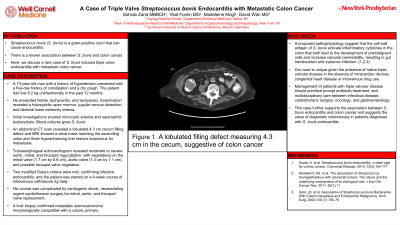Sunday Poster Session
Category: Colon
P0209 - A Case of Triple Valve Streptococcus bovis Endocarditis With Metastatic Colon Cancer
Sunday, October 22, 2023
3:30 PM - 7:00 PM PT
Location: Exhibit Hall

Has Audio
- SZ
Sohrab Zand, MBBCh
Cayuga Medical Center
Ithaca, NY
Presenting Author(s)
Sohrab Zand, MBBCh1, Vladislav Fomin, MD2, Madeleine Mogl, 3, David Wan, BS, MD4
1Cayuga Medical Center, Ithaca, NY; 2New York-Presbyterian Hospital/Weill Cornell Medical College, New York, NY; 3Technical University of Munich School of Medicine, Munich, Bayern, Germany; 4Weill Cornell Medicine, New York, NY
Introduction: Streptococcus bovis (S. bovis) is a gram-positive cocci that can cause endocarditis. There is a known association between S. bovis and colon cancer. Here, we discuss a rare case of S. bovis induced triple valve endocarditis with metastatic colon cancer.
Case Description/Methods: A 73-year-old man with a history of hypertension, ruptured appendicitis, and a ventral hernia presented with a five-day history of constipation and a dry cough. The patient had lost 8.2 kg unintentionally in the past 12 months. He presented febrile, tachycardic, and tachypneic. Examination revealed a holosystolic apex murmur, jugular venous distention, and bilateral lower extremity edema. Initial investigations showed microcytic anemia and neutrophilic leukocytosis. Blood cultures grew S. bovis. An abdominal CT scan revealed a lobulated 4.3 cm cecum filling defect and a 1.2 cm hepatic dome hypodensity. Transesophageal echocardiogram revealed moderate to severe aortic, mitral, and tricuspid regurgitation, with vegetations on the mitral valve (1.7 cm by 0.6 cm), aortic valve (1.3 cm by 1.1 cm), and possible tricuspid valve vegetation. Two modified Duke's criteria were met, confirming infective endocarditis, and the patient was started on a 4-week course of intravenous ceftriaxone 2g daily. His course was complicated by cardiogenic shock, necessitating urgent cardiothoracic surgery for mitral, aortic, and tricuspid valve replacement. MRI showed a cecal mass reaching the ascending colon and three hypoenhancing liver lesions suspicious for metastasis, with a liver biopsy confirming metastatic adenocarcinoma morphologically compatible with a colonic primary.
Discussion: A proposed pathophysiology suggest that the cell wall antigen of S. bovis activate inflammatory cytokines in the colon that both lead to the development of premalignant cells and increase vascular permeability, resulting in gut translocation and systemic infection. Our case is unique given the presence of native triple valvular disease in the absence of intracardiac devices, congenital heart disease or intravenous drug use. Management of patients with triple valvular disease should prioritize prompt antibiotic treatment, and multidisciplinary care between infectious disease, cardiothoracic surgery, oncology, and gastroenterology. This case further supports the association between S. bovis endocarditis and colon cancer and suggests the value of diagnostic colonoscopy in patients diagnosed with S. bovis endocarditis.

Disclosures:
Sohrab Zand, MBBCh1, Vladislav Fomin, MD2, Madeleine Mogl, 3, David Wan, BS, MD4. P0209 - A Case of Triple Valve Streptococcus bovis Endocarditis With Metastatic Colon Cancer, ACG 2023 Annual Scientific Meeting Abstracts. Vancouver, BC, Canada: American College of Gastroenterology.
1Cayuga Medical Center, Ithaca, NY; 2New York-Presbyterian Hospital/Weill Cornell Medical College, New York, NY; 3Technical University of Munich School of Medicine, Munich, Bayern, Germany; 4Weill Cornell Medicine, New York, NY
Introduction: Streptococcus bovis (S. bovis) is a gram-positive cocci that can cause endocarditis. There is a known association between S. bovis and colon cancer. Here, we discuss a rare case of S. bovis induced triple valve endocarditis with metastatic colon cancer.
Case Description/Methods: A 73-year-old man with a history of hypertension, ruptured appendicitis, and a ventral hernia presented with a five-day history of constipation and a dry cough. The patient had lost 8.2 kg unintentionally in the past 12 months. He presented febrile, tachycardic, and tachypneic. Examination revealed a holosystolic apex murmur, jugular venous distention, and bilateral lower extremity edema. Initial investigations showed microcytic anemia and neutrophilic leukocytosis. Blood cultures grew S. bovis. An abdominal CT scan revealed a lobulated 4.3 cm cecum filling defect and a 1.2 cm hepatic dome hypodensity. Transesophageal echocardiogram revealed moderate to severe aortic, mitral, and tricuspid regurgitation, with vegetations on the mitral valve (1.7 cm by 0.6 cm), aortic valve (1.3 cm by 1.1 cm), and possible tricuspid valve vegetation. Two modified Duke's criteria were met, confirming infective endocarditis, and the patient was started on a 4-week course of intravenous ceftriaxone 2g daily. His course was complicated by cardiogenic shock, necessitating urgent cardiothoracic surgery for mitral, aortic, and tricuspid valve replacement. MRI showed a cecal mass reaching the ascending colon and three hypoenhancing liver lesions suspicious for metastasis, with a liver biopsy confirming metastatic adenocarcinoma morphologically compatible with a colonic primary.
Discussion: A proposed pathophysiology suggest that the cell wall antigen of S. bovis activate inflammatory cytokines in the colon that both lead to the development of premalignant cells and increase vascular permeability, resulting in gut translocation and systemic infection. Our case is unique given the presence of native triple valvular disease in the absence of intracardiac devices, congenital heart disease or intravenous drug use. Management of patients with triple valvular disease should prioritize prompt antibiotic treatment, and multidisciplinary care between infectious disease, cardiothoracic surgery, oncology, and gastroenterology. This case further supports the association between S. bovis endocarditis and colon cancer and suggests the value of diagnostic colonoscopy in patients diagnosed with S. bovis endocarditis.

Figure: A lobulated filling defect measuring 4.3 cm in the cecum, suggestive of colon cancer
Disclosures:
Sohrab Zand indicated no relevant financial relationships.
Vladislav Fomin indicated no relevant financial relationships.
Madeleine Mogl indicated no relevant financial relationships.
David Wan indicated no relevant financial relationships.
Sohrab Zand, MBBCh1, Vladislav Fomin, MD2, Madeleine Mogl, 3, David Wan, BS, MD4. P0209 - A Case of Triple Valve Streptococcus bovis Endocarditis With Metastatic Colon Cancer, ACG 2023 Annual Scientific Meeting Abstracts. Vancouver, BC, Canada: American College of Gastroenterology.
